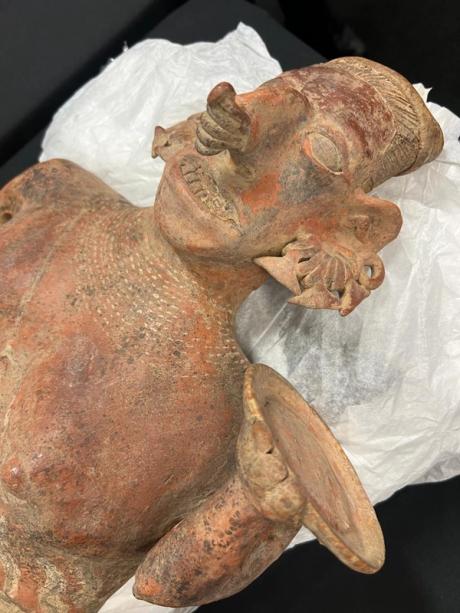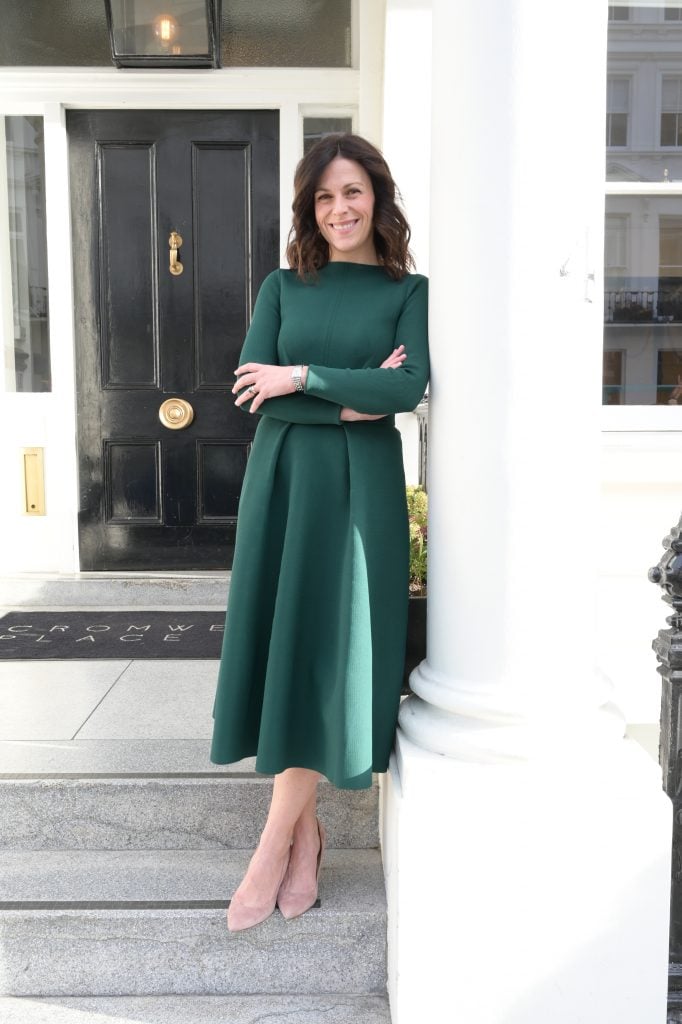Cimarrón
2020 - Sculpture (Sculpture)
70 x 120 x 120 cm
Paloma Contreras Lomas
Paloma Contreras Lomas has frequently used animals as metaphors in her work. This work’s title, Cimarrón , is the Spanish word for an untamed animal, the wild vegetation that grows in the open, or a runaway slave. Cimarrón is part of a larger series in which the artist turned scaled-up Mexican hats into meticulously hallucinatory landscapes. For these soft sculptures, Contreras uses different types of fabrics and synthetic materials that are traditionally associated with femininity. These floating, ready-to-wear works exist somewhere between a miniature diorama and a theatrical prop. However, a grain storehouse or a hydroelectric plant embedded into the landscape are the main characters of what the artist calls the ‘Mexican thriller’. The industrial structures that protrude from the landscape underscore the lost promise of a revolutionary agricultural class, coexisting with the ongoing threat of neoliberal industrial exploitation. Within this context, Cimarrón appears as a rugged and velvety, sexualized scenery, referencing the Mexican landscape as both a site of political revolution and one of exploitation and violence.
A writer and an artist, Paloma Contreras Lomas has developed a practice in which literature and fiction play a major role, allowing her to address a series of topics regarding race and class that are rarely broached by a traditional Mexican society. Positioning herself as operating from a feminine condition rather than a feminist stand, the artist claims her right to confront those particular political issues that have historically been associated with male libido, such as the relationship between nationalism and the occupation and instrumentalization of territory, and the further inscription of an extractive global economy. From that perspective, Contreras’s work seems to inscribe itself as the next logical step after the 1990’s activist take of artists like Minerva Cuevas, giving a much broader context to those very same issues as she reframes them at point in (Mexican) history in which gender violence, and the voices against it, have reached a peak. The artist’s amalgamation of narrative, film, performance, drawing, and sculpture offers alternative approaches to address social urgencies from a very personal, and sometimes autobiographical, perspective. Contreras is also a part of the Mexican artist collective Bikini Wax, formed in 2011. Bikini Wax founded an artist-run space whose undertakings have been characterized by a multidisciplinary and pedagogical approach to art.
Colors:
Other related works, blended automatically
» see more

© » KADIST
Paloma Contreras Lomas
2020Paloma Contreras Lomas sometimes incorporates large scale drawing into her practice...
Related works sharing similar palette
» see more

© » KADIST
Jeffry Mitchell
2012Though the title might suggest an Adonis, Jeffry Mitchell’s The Swimmer (2012) is a squat, jolly man with a protuberant belly...
Other works by: » Paloma Contreras Lomas
» see more

© » KADIST
Paloma Contreras Lomas
2020Paloma Contreras Lomas sometimes incorporates large scale drawing into her practice...
Related works found in the same semantic group
» see more

© » KADIST
Jill Magid
2016In 1995, the personal and professional archives of the Mexican architect Luis Barragán were acquired (including the rights to the name and the work of the architect) by the Swiss furniture enterprise Vitra...

© » KADIST
Julio Cesar Morales
2008The video Interrupted Passage presents a performance Morales staged in the former home of Mariano Guadalupe Vallejo, a mid-nineteenth-century Mexican general serving in California...

© » THEARTNEWSPER
30 archaeological artefacts returned to Mexican authorities in Los Angeles ceremony Art market Museums & heritage Exhibitions Books Podcasts Columns Technology Adventures with Van Gogh Search Search Museums & Heritage news 30 archaeological artefacts returned to Mexican authorities in Los Angeles ceremony Objects ranging from the 1st century to the 15th century were handed over at the Mexican consulate in Los Angeles earlier this month Benjamin Sutton 9 February 2024 Share An elaborately rendered ceramic figure that was handed over to Mexican authorities in Los Angeles on 1 February Mexico Ministry of Culture Anthropomorphic ceramic figures, necklace beads, vessels and more archaeological objects were turned over to Mexican authorities, including the country’s visiting secretary of foreign affairs, Alicia Bárcena Ibarra, during a ceremony this month at Mexico’s consulate in Los Angeles...

© » KADIST
Andrea Bowers
2010The small drawings that comprise Study from May Day March, Los Angeles 2010 (Immigration Reform Now) and We Are Immigrants Not Terrorists are based on photographs taken at a political rally in downtown Los Angeles in which thousands of individuals demonstrated for immigrants’ rights...



